GCSE results: 10 key insights for teachers

GCSE exam results are out and, as with A levels, the overall data shows a return to grades similar to those seen before the pandemic, although this year’s grades are still slightly above those in 2019.
Beyond the main headlines, though, Tes has picked through the data to pull out other key trends and insights that teachers, leaders and those across education should know about.
GCSE results 2023: 10 big trends
Here’s a round-up of all the key insights from GCSE results days 2023:
1. Grades fell as expected
Overall, the proportion of GCSE entries graded 7/A and above was 21.6 per cent - down 4.4 percentage points on 2022 but above the 20.6 per cent of entries that received the grade 7/A or above in 2019.
Some 4.9 per cent of GCSE entries got a top grade of 9, down 1.7 percentage points on 2022, but this was up slightly on the 4.5 per cent awarded in 2019.
The proportion of grade 4/C and above in 2023 dropped to 67.8 per cent, down 5.2 percentage points compared with 2022, but slightly above the 67 per cent figure from 2019.
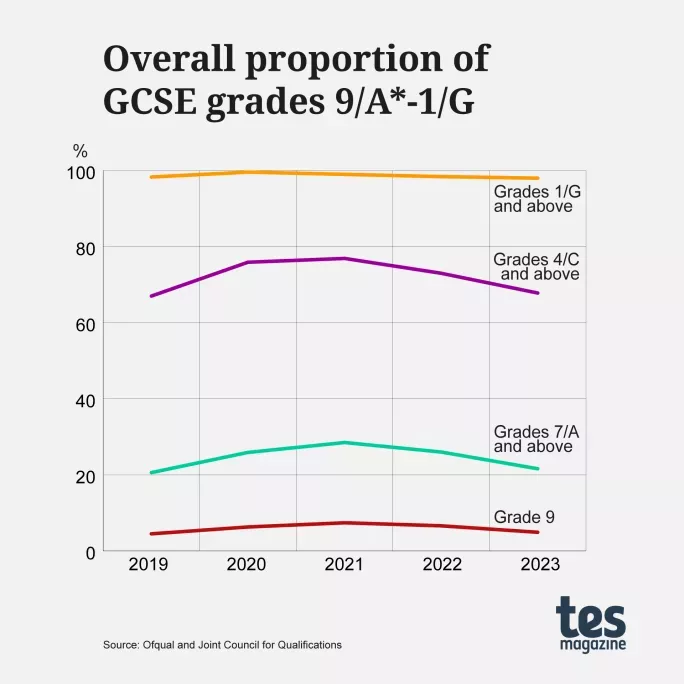
Such a decline had been expected as exams watchdog Ofqual this year sought to tackle grade inflation caused by the pandemic when exams were cancelled and centre-assessed grades (CAGs) and then teacher-assessed grades (TAGs) were used.
Louis Hodge, associate director at the Education Policy Institute, said that while there was no “perfect solution” to solving this problem, given that it would mean this year’s exam cohorts would see results decline compared with previous years, the system had proven “reasonable and pragmatic”.
2. Regional inequalities widened
However, the return to grading “normality” has only served to underline the pre-existing issue of the disparity in attainment between the regions.
Specifically, today’s data shows that the North East had the lowest proportion of GCSE grades at 7/A or above (17.6 per cent), while London had the highest proportion (28.4 per cent). This is a gap of 10.8 percentage points - an increase from the 9.3 per cent seen in 2019.
More generally, the South continues to outperform the North, with the South West, South East, London and the East of England the only regions to achieve over 20 per cent of students getting 7/A or above. All the northern regions were under 20 per cent, with the highest average in the North West, at 18.6 per cent.
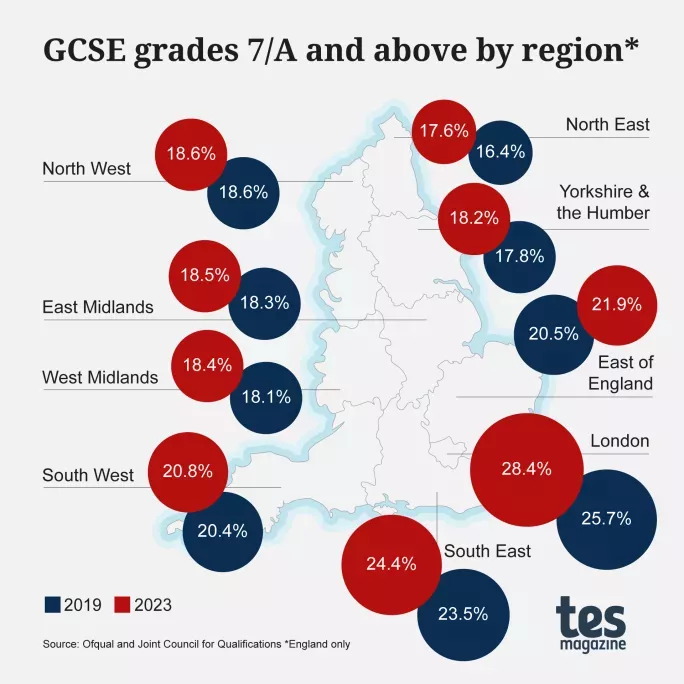
Hodge said it was clear that the pandemic had “exacerbated inequalities in pupil outcomes”, and this was being seen in results.
“The environment for schools remains challenging,” he said. “The disadvantage gap is at its widest in a decade and pupil absences remaining stubbornly high.”
3. Resits rose
Perhaps unsurprisingly, given the return to the pre-pandemic grading standard, the number of students required to take resits for GCSE maths and English has increased compared with 2022 - but it is slightly lower than in 2019.
This year, a massive 332,000 English and maths exams failed to achieve a passing grade - an increase of 59,773 compared with 2022. The 2023 figure is also worse than 2019, when 317,289 failed to pass either English or maths.
Of those who failed this year, 164,237 were from English papers (28.4 per cent of students who sat the exam) and 167,763 were from maths papers (27.7 per cent). This represents an increase of 38,006 on the number who failed English in 2022 and 21,767 on the number in maths.
Professor Becky Francis, chief executive of the Education Endowment Foundation, said that with so many more young people from “socio-economically disadvantaged backgrounds more likely to be affected” by this rise in resits, support had to be targeted at these students.
Of those who took their English or maths GCSE resit in summer 2023, 77 per cent (101,903) failed to secure a passing grade in English and a whopping 86.7 per cent (116,744) failed to secure a passing grade in maths.
This is worse than with the 2019 resit cohorts. In that year, 72.6 per cent of English resits were failed and 82.6 per cent of maths resits.
Given that this year’s retake students will have faced a lot more disruption than the 2019 cohort, this difference is understandable. However, the stark increase from 2022 perhaps shows how students this year may feel hard done by compared with their counterparts the year before.
4. The most popular subjects remained unchanged
Unlike at A level, where there were some notable changes in the popularity of certain subjects, GCSEs remain far more stable, with no changes in the top 10 for the number of entries.
Science double award - technically counting as two entries per student - leads the way, followed by maths, English, English literature and history. Geography, religious studies, art and design subjects, biology and chemistry complete the top 10.
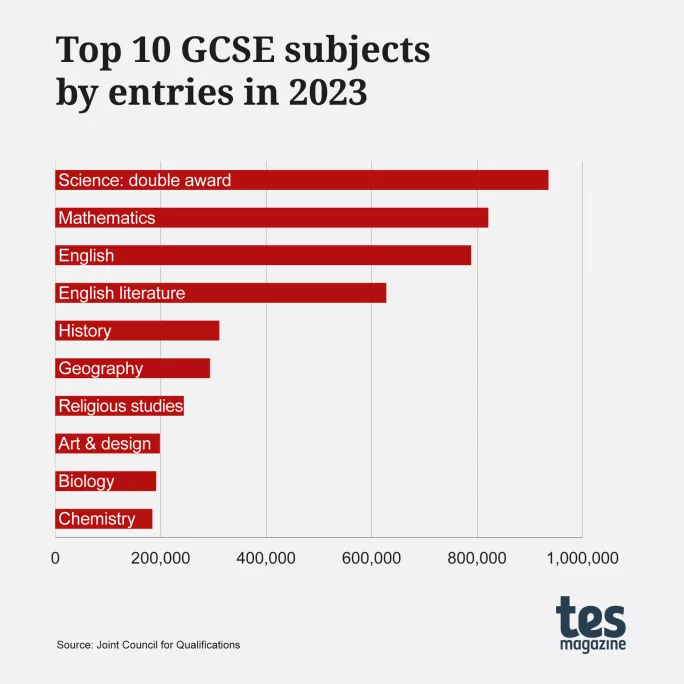
The lack of any modern foreign language (MFL) within the top 10 shows once again why the government’s aim of 90 per cent of all students studying the English Baccalaureate combination of subjects by 2025 appears unlikely to be achieved.
5. Mixed MFL fortunes
Looking in more detail at the exams data for languages, there were mixed fortunes for the big three of French, German and Spanish.
French saw a small increase of 1,913 entries to 130,901 in total, while Spanish saw a far healthier 11.3 per cent rise, from 112,845 entries to 125,651 - meaning it has almost caught French in popularity.
The increase in entries for Spanish will no doubt please policymakers hoping to boost the uptake of languages, especially given that £15 million was set aside earlier this year to help with this effort.
This money may well have to be directed chiefly towards enticing students to study German after the subject saw a further decline in entries to 34,707 - down slightly on 2022 (36,327) and down significantly on 2019 (42,791).
6. Business is booming
One of the biggest success stories in terms of an increase in entries was business studies, which saw a rise of 14.8 per cent (from 107,283 to 123,166).
Statistics rose by 20.4 per cent to 26,599 entries, and computing increased by 11.6 per cent, reaching 90,558 entries.
History (6.5 per cent), maths (4.9 per cent) and English (4.3 per cent) were among the bigger subjects that enjoyed strong growth.
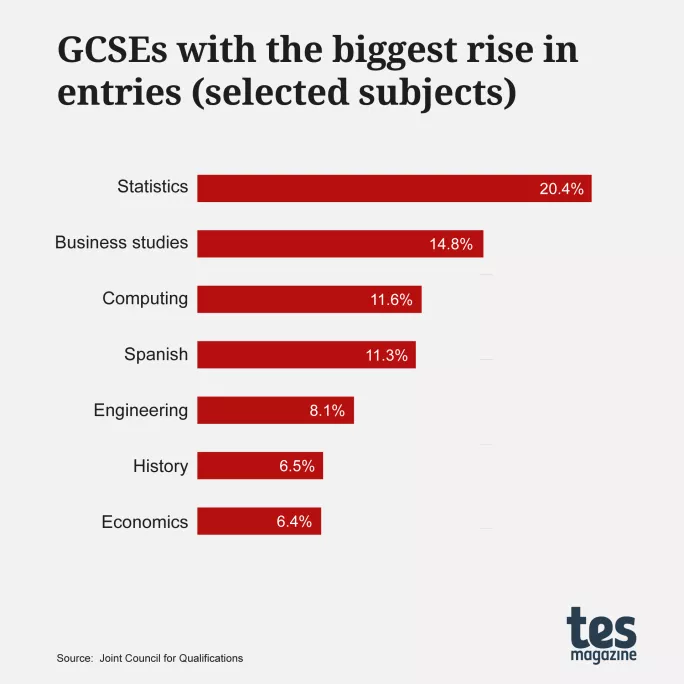
Economics and engineering also had increases, with Beth Elgood, of EngineeringUK, saying this was pleasing to see.
“We want to see more young people from all backgrounds progressing into engineering and technology, and it’s encouraging to see some increases in those taking the GCSE subjects that offer pathways into those careers,” she said.
7. Arts saw a decline
However, not all subjects fared so well. ICT, for example, saw its entries fall by 7.3 per cent to just 8,753. In 2015 the subject had over 100,000 entries.
As noted, German suffered a sizeable decline, as did music, with entries dropping by 12.5 per cent to reach just 32,980.
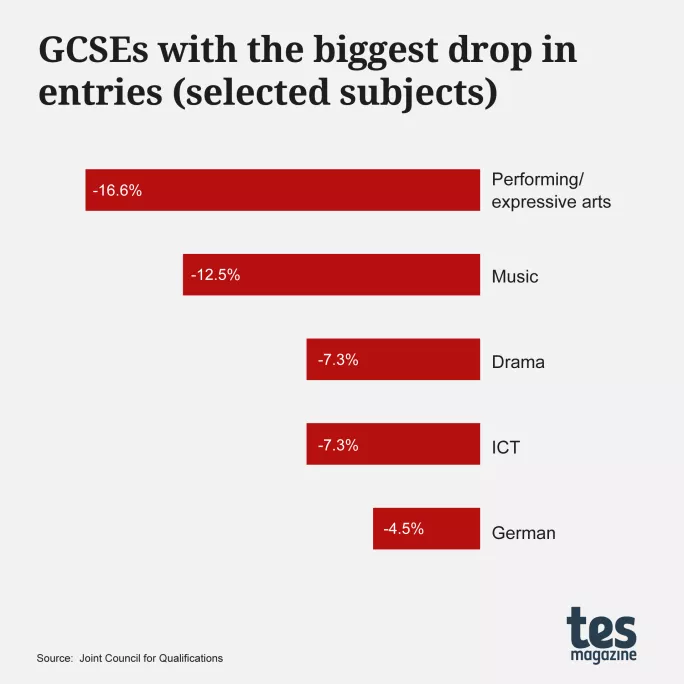
Dr Steven Berryman, president of the Chartered College of Teaching (CCT) and director of creativity, music and culture at the Charter Schools Educational Trust, told Tes that it was troubling that music entries had fallen again, and said that schools and trusts had to tackle this head on.
“It’s vital young people can access these subjects as part of a broad and balanced curriculum, and leaders will need to make some accommodations for subjects that are in such decline,” he said.
“We can’t blame external factors alone, and while broader educational policies do not always amplify the value of the arts, schools and their leaders can be brave to ensure the arts exist in all key stages in their settings.”
Among the creative subjects, it’s not just music that saw entries drop either. Performing/expressive arts and drama also fell by 16.6 per cent and 7.3 per cent respectively.
8. The gender divide in subjects
As with A levels, there are some clear gender divides in GCSEs in terms of subject choices. For example, boys heavily favour construction, engineering, computing, economics and ICT.
Girls, meanwhile, are far more likely to take performance/expressive arts, drama, and art and design subjects, and are slightly keener on French and Spanish. The majority of subjects are fairly evenly split, however.
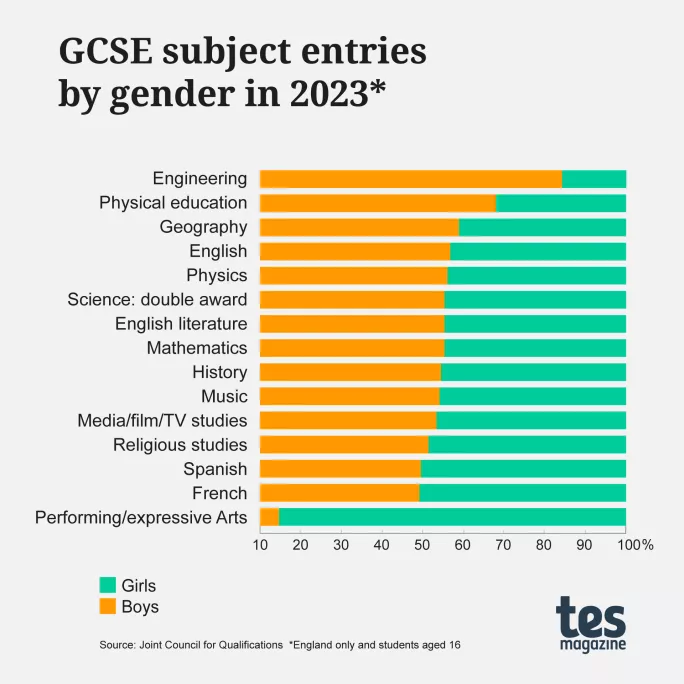
Commenting on the gender split in subjects like engineering, computing, and design and technology, Elgood said it was important to encourage more girls to continue onward study in these subjects to tackle the “female underrepresentation in engineering and technology careers” and ensure a strong workforce in these areas.
9. National Reference Test insights
The 2023 National Reference Test (NRT) results were also released today, and unlike the GCSE exams, these tests were marked without any generosity and therefore provide an unfiltered insight into the performance of this year’s cohort.
Results in English show a small increase at the grade 4 level when compared with 2022, up 0.9 percentage points. At the grade 9 level there has been an increase again, up to 17.8 per cent, an increase of 0.9 percentage points
In maths, though, results declined slightly when compared with 2022, with 70.2 per cent achieving a grade 4, a drop of 1.2 percentage points. While at the grade 9 level there was a drop of 1.1 percentage points to 19.9 per cent.
Sutton Trust founder Sir Peter Lampl said the data shows that “English and maths are moving in opposite directions”, and pointed out that although English is now closer to pre-pandemic levels in 2020, maths has “fallen further” at both the top and pass grade standard.
10. Average number of subjects taken and top grades
Finally, Ofqual revealed that the most common number of subjects that a student took was nine (taken by 27.3 per cent of students). Eight subjects were taken by 24.3 per cent of students. A hardy 1.8 per cent of students took 11 GCSEs (11,515 students). Some 435 students took 12 subjects.
Furthermore, of those who took 11 or more GCSEs, an impressive 125 achieved all 9/A*s. This number is actually higher than the number of students who sat seven GCSEs and achieved all 9/A* - 90 students - and those who sat eight GCSEs and achieved all 9/A*s - 115 students.
Of the total 1,160 students who achieved all A*s, 62 per cent were girls.
Register with Tes and you can read two free articles every month plus you'll have access to our range of award-winning newsletters.
Keep reading with our special offer!
You’ve reached your limit of free articles this month.
- Unlimited access to all Tes magazine content
- Save your favourite articles and gift them to your colleagues
- Exclusive subscriber-only stories
- Over 200,000 archived articles
- Unlimited access to all Tes magazine content
- Save your favourite articles and gift them to your colleagues
- Exclusive subscriber-only stories
- Over 200,000 archived articles
topics in this article



